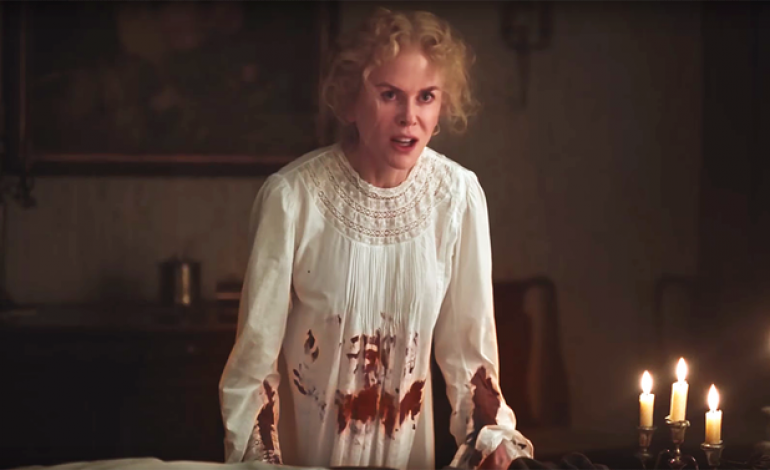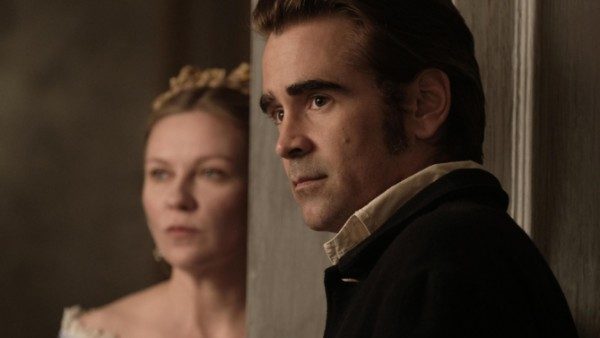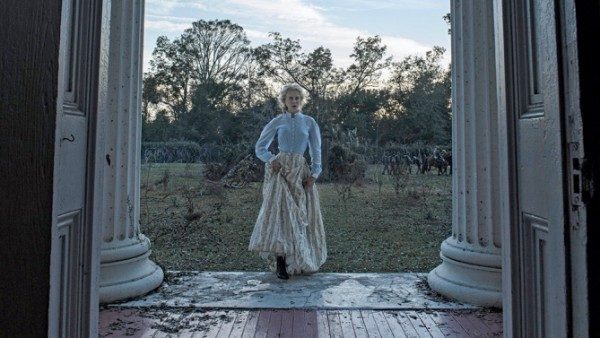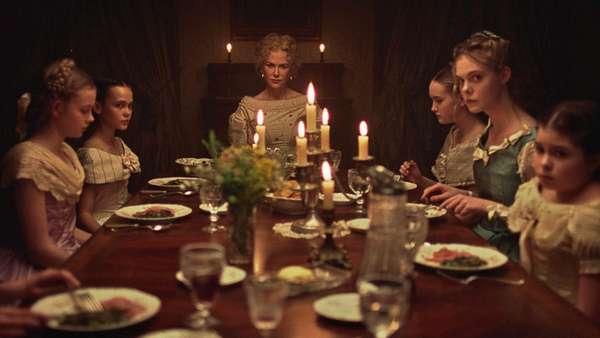

Throughout her filmography, Sofia Coppola luxuriates in characters at their most bored. This isn’t to suggest her movies are boring (they aren’t), but as a filmmaker, Coppola is attuned to the specific dimensions of ennui that shape her characters’ point of view. From the languid teenagers of The Virgin Suicides, the sleep-deprived Americans abroad in Lost in Translation, the overwhelmed teenage monarch roaming the halls of Versailles in Marie Antoinette, the sleepy Hollywood vagabonds of Somewhere to the disaffected young leches of The Bling Ring, Coppola often expresses a curiosity in examining characters seemingly at their most listless and detached. Perhaps this curiosity is steeped in Coppola’s own experience as a member of one of Hollywood’s most august lineages where she grew up in the monotony-filled trenches of film sets.
The Beguiled, Coppola’s latest and sixth feature, traverses similar grounds even as the overall scope is broadened and the mood is, in a departure for the filmmaker, fundamentally more suspenseful and strikingly focused on female sexual repression. Set at a Virginia girls’ boarding school during the Civil War, Coppola follows her characters, at least on the onset, in nearly debilitating boredom. As the canons boom in the background, Coppola lingers quietly and dispassionately on the young girls as they conjugate French verbs, practice their musical instruments and tend to their household chores with the sort of delicate precision one would likely expect from Coppola.
The routine is by design for Martha (Nicole Kidman), headmistress of Miss Farnsworth’s Seminary for Young Ladies, for while the tragedy and chaos of the outside world is eerily close to home, her task is to shield the small group of women assembled at her plantation-like school – none of whom have anywhere else to go. The design is tested upon the arrival of an unexpected visitor in the form of Corporal John McBurney (Colin Farrell), a badly injured Union soldier who is taken in to convalesce a stricken leg. Martha is clear from the start: “You’re our most unwelcome visitor, and we do not propose to entertain you.” He is the enemy after all.
For the prim and rational Martha, to the homely Edwina Dabney (Kirsten Dunst), her second in command, to the young students, John’s presence elicits immeasurable curiosity and untapped desire; they haven’t seen much in the way of male company in quite a long time after all. Strikingly, shortly after John’s arrival, all the women in the house begin dressing nicer and wearing their fancy jewelry for evening dinners. Alicia (Elle Fanning), the school’s teenage mischief-maker, teasing early on to show off their Southern hospitality. For this, The Beguiled grows trickier with each passing scene as John puts on the charm – it’s never quite clear if this is out of old-fashioned chivalry or more draconian gamesmanship – and the women subject their charge to a continual and increasingly heightened gaze. Coppola herself builds the tension, full of hormones and sexual arousal, with masterful elan.
The story grows more lurid as it moves along, as rooted in the Thomas Cullinan novel in which the film is based and the subsequent 1971 Don Siegel film adaptation which starred Clint Eastwood and Geraldine Page, a film which has been described as everything from softcore shlock to essential feminist viewing (the truth likely lies somewhere in the middle). Yet as the sexual mind-games escalate into a violent fever dream, Coppola’s restraint and classical composition marks a film of surprising depth and sensitivity. It’s stemmed in Coppola’s unyielding compassion for her characters: Martha, for one is never represented as an extremist Southern puritan in heat, but a pragmatic voice of reason increasingly troubled by the desires of her house. While Edwina, a lilting wallflower, is sparked by a newfound sense of possibility due to John’s seemingly genuine advances. This advances to John as well. He may alternate between eye candy and totem of male ego, but Coppola is more clever than to paint him on reductive good or bad terms.
Further rewarding are the lived-in performances of the terrific ensemble cast. Kidman, at her most headstrong, leads with near surgical precision, gently anchoring alternately by reason and emotion. Martha cogently evaluates what’s right as dictated by her faith before quietly pent-up eroticism strikes while stitching up and washing down John. In Kidman’s hands, even Martha’s more unhinged behavior in the final sequences is made manifest by her firmly cemented values of doing what’s right. Similarly, Dunst – who deserves best in show honors – is poignant and wonderfully understated in charting Edwina’s desires and seeming loss of sensibility; Dunst has similarly made strong impressions in previous outings with Coppola (The Virgin Suicides, Marie Antoinette).
The filmmaking on its own is absolutely gorgeous. From Philippe Le Sourd’s elegant cinematography to Stacey Battat’s playful and character building costume designs to Sarah Flack’s crisply taut cuts, The Beguiled is one of Coppola’s most confidently framed and structurally beautiful movies. If there’s a weakness to The Beguiled, it may that it’s a tad too classy, too delicately embroidered for its own good from time to time. For Coppola’s first nod towards genre filmmaking, it’s only in the last twenty minutes where a “plot” really arises – if anything this might be a rare example where a longer cut might make a very good movie a great one. (The Beguiled chugs a long at an even click throughout its trim 93-minute running time.) At any rate, Coppola is rather adept in a darker template. Encore!
Sofia Coppola’s meticulously and lusciously staged period picture is at once a departure for the Oscar-winning auteur and perfectly complimentary with her previous filmography. The Beguiled is easily her most “plotted” movie as well as the first that could be ascribed to a genre – and is likely her most verbose. Yet underneath the masterfully and delicately glossed surface lies sensitive and difficultly persuasive character studies and astute observations of gender and sexuality. The set-up is pure pulp, but Coppola’s mastery behind the camera coupled with the lived-in thoughtfulness of the performances gracefully and cogently take the proceedings seriously. While the film will likely divide (a common Coppola occurrence), The Beguiled will surely be one of 2017’s more significant motion pictures and likely spark some of the most fascinating discussions.



